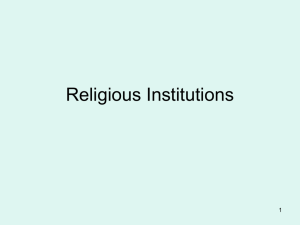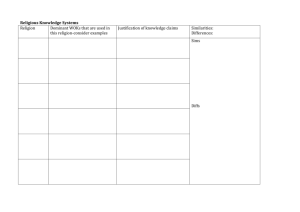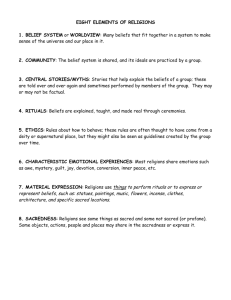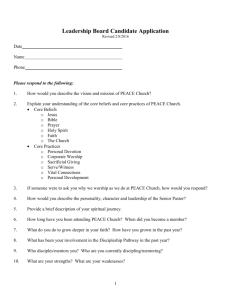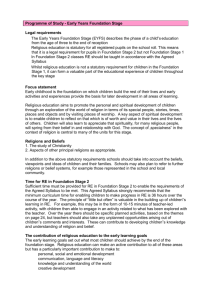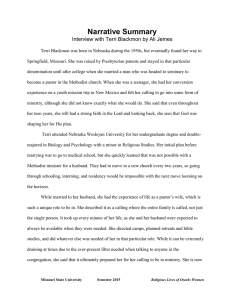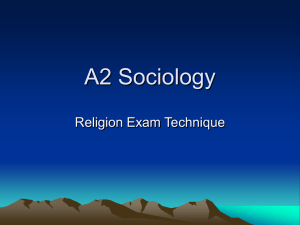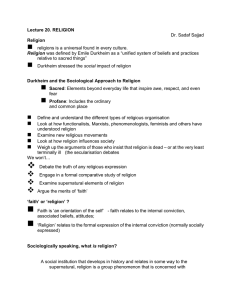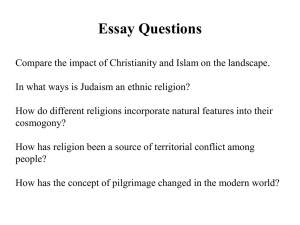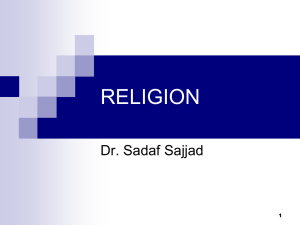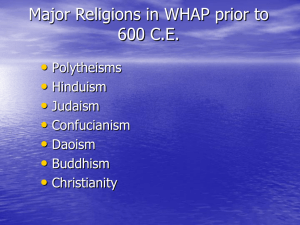201.16 Religious Institutions
advertisement
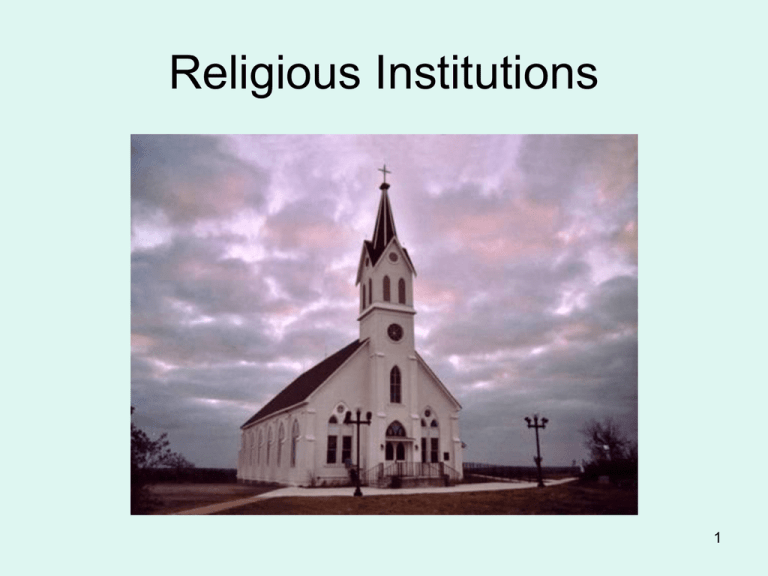
Religious Institutions 1 Religion and Society • What is religion? – A system of beliefs, rituals, and ceremonies – Promotes community among followers – Provides a personal spiritual experience for its members 2 The Great Transformation of Societies • In preindustrial societies, religion dominates all aspects of society. • In industrial societies, the institution of religion has become separated from many social and economic activities – Why do you think this is the case? 3 Function of Religion • What does religion do for people? – Gives them hope of something better than what they have now. – Gives answers to unknowing questions. • What happens when I die? • Why am I here? • What is the point to life? – Serves to bind people together in times of crisis and confusion 4 Social Change • How can religion contribute to social change? • Protestant work ethic: • Disciplined commitment to worldly labor driven by a desire to bring glory to God • Shared by followers of Martin Luther and John Calvin • Do you think Religion teaches ‘work ethic’? • How? 5 Social Control • Can religion control society? – Yes? – Inhibits social change – Forces masses into submission by offering a consolation for their harsh lives on earth – Promotes social instability by perpetuating patterns of social inequality – Believers vs. Nonbelievers 6 Examples of Social Control by Religion 7 Examples of Social Control by Religion 8 Gender and Religion – Women have played fundamental role in religious socialization • However, they take subordinate role in religious leadership • Most religions are patriarchal – Leader is a male – Reinforce men’s dominance in secular and spiritual matters • Women compose 12.8 percent of U.S. clergy 9 Characteristics of Religion • Beliefs – Ideas, based upon faith, that people consider true • The sacred – Sacred: that which has supernatural qualities • Rituals – Routines that reinforce the faith • Moral communities – People who share a religious belief • Personal experience – Grants meaning to life 10 Americans Believe 11 3 Components of Religion • Denominations • Sects • Cults 12 Components of Religion – Denomination: – Large, organized religion with strong support in the world – Christianity – Muslim – Judaism – Hinduism 13 Components of Religion – Sect: – Relatively small religious group that has broken away from some other religious organization to renew what it considers the original vision of the faith • Protestants • Episcopalians • Church of Christ 14 American’s Religious Preferences 15 Components of Religion – Cult – Small, alternative faith community that represents either a new religion or a major innovation in an existing faith • Similar to sects • Tend to be small • Are often viewed as less respectable than more established faiths 16 Sects and Cults • Cults – Non-conventional religious group – Social conditions demand separation – Members required to withdraw from normal life – Full-time communal obligation for members 17 Christianity • World’s largest religion • 2 largest branches – Roman Catholic • Pope is head of Church in Vatican City. – Protestant • Luther breaks away from Roman Catholic Church in 16th century 18 Goal of Christianity Judaism • Numerically smallest of world religions • Important beliefs: – God’s chosen people – Torah: first 5 books of the Bible; oldest truths from God • Major divisions – Orthodox: strictly traditional – Reform: liberal and worldly – Conservative: middle ground between Orthodox and Reform 20 Goals of Judaism Hinduism • Largest of the Eastern religions – Concentrated largely in India • Important beliefs – Dharma: special force that makes daily demands and sacred obligations • Comes from main God = Shiva – Karma: spirit remains through life, death, rebirth • Organization – Caste membership 22 Symbols of Hinduism Buddhism • Large religion throughout Asia – Includes southeast Asian countries and China • Based upon teachings of Buddha (the enlightened one) – Only monks can spread his teachings • Important beliefs – To relieve human suffering one must follow a path that ultimately leads to enlightenment – “Right” thoughts and actions must be daily performed and evaluated through meditation 24 Buddhist Monks Confucianism • Confucius – attempted to solve practical problems of daily living • Jen: human sympathy that binds people in 5 basic relationships – Sovereign and subject – Parent and child – Older brother and younger brother – Husband and wife – Friend and friend 26 27 Is religion bad? • Stunts intellectual growth – Spanish Inquisition • Arrested or killed any philosophers against Church. – Galileo – Enlightenment Movement in Europe. • Causes social inequality – Believers vs. nonbelievers – Denomination vs. Denomination Is religion good? • Gives hope of something better! • Answers questions science fails to. • Gives us community spirit! – Not to mention cool holidays!
